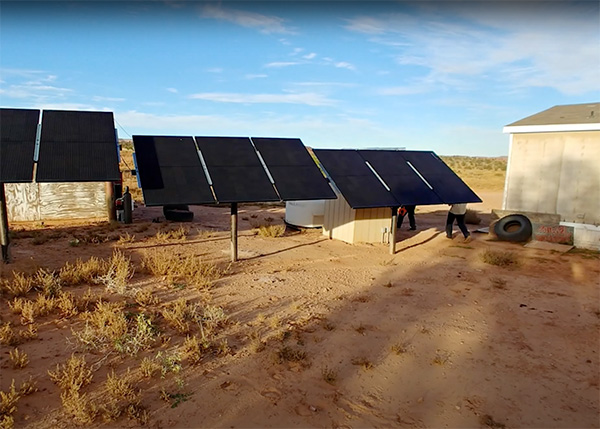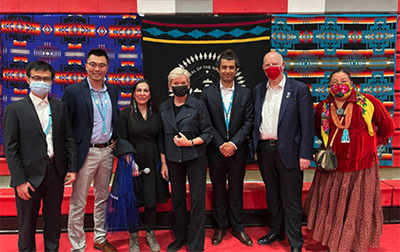The Navajo Nation stretches over three states and 27,000 square miles of ponderosa forests, red rock deserts, and ancient volcanoes. Its vast and largely rural expanse, along with complex socio-economic issues, presents difficulties in providing basic infrastructure and services for its residents. Of the 173,000 people who live there, about 40 percent do not have access to reliable electric power.
 After winning the first phase of the U.S. Department of Energy’s $100,000 Energizing Rural Communities Prize, a University of Utah led team called Energizing Dinétah is set to confront this energy justice gap.
After winning the first phase of the U.S. Department of Energy’s $100,000 Energizing Rural Communities Prize, a University of Utah led team called Energizing Dinétah is set to confront this energy justice gap.
“We’re eager to generate holistic ways to bring reliable and resilient power to the Diné people, but there is a huge socio-technical gap to leap through if we want to apply urban clean energy solutions to native lands,” says team leader Mingxi Liu, an assistant professor in the Department of Electrical and Computer Engineering.
“This drives us to rethink the purpose of engineering; should people and culture adapt to technology or the other way around? In this project, we aim to enable the nexus between technology, people, and culture through the partnership with the Navajo Nation.”
Part of the DOE’s larger Energy Improvements in Rural or Remote Areas Program, the Energizing Rural Communities Prize Partner Track pulls from a $10M prize pool and is divided into two phases. Winning the first comes with $100,000 of funding and allows teams to move onto the second phase, where their projects could be awarded up to $200,000.
Energizing Dinétah is perfectly in line with the prize’s objective to form vitalizing partnerships with rural communities. By working closely with individual Chapters (the Navajo Nation’s most local form of government) the team seeks to enlarge the Navajo Nation’s clean energy capacity and self-reliance. This entails not only laying the groundwork for critical infrastructure, but hosting grant-writing workshops, outreach activities, and training and educational programs.
The Energizing Dinétah team includes team lead Liu, Mostafa Ardakani, Associate Professor of Electrical and Computer Engineering, Shundana Yusaf, University of Utah School of Architecture Associate Professor, and Renae Hoshnic, former Legislative District Assistant of the 24th Navajo Nation Council and tribal member.

All group members are part of the Nááts’íilid Initiative, an indigenous-led community development collaborative. The team has already assisted the Kayenta Chapter secure $1.3 million to develop a solar-energy-based microgrid—a success which elicited collaborations with other Chapters, and a meeting with U.S. Secretary of Energy Jennifer Granholm.
With the granting of this new DOE prize, Energizing Dinétah’s community-centered, ground-up approach is further recognized and realized. All subsequent skills taught, knowledge shared, and relationships built is a step towards the teams and their tribal collaborators’ mission to strengthen the cultural and economic resilience of the Navajo people.
Recipients of Phase Two funding will be announced in August of next year.